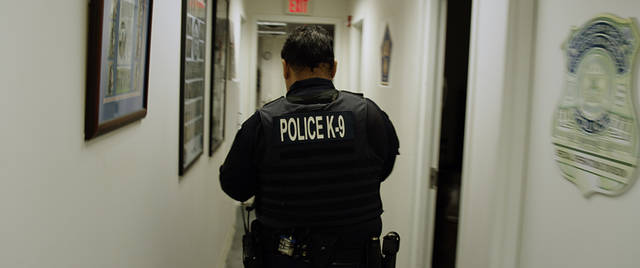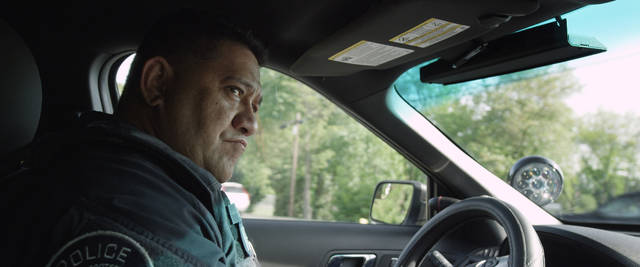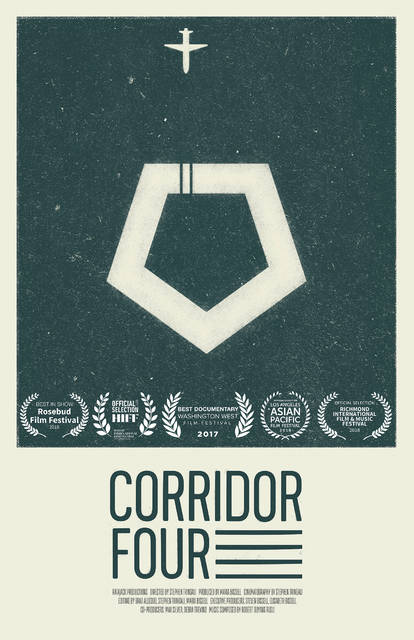After a tragedy: Film chronicles Hawaii native’s life after September 11, 2001



KAILUA-KONA — Isaac Ho’opi’i’s story has been shared many times following the terrorist attacks of Sept. 11, 2001.
KAILUA-KONA — Isaac Ho’opi’i’s story has been shared many times following the terrorist attacks of Sept. 11, 2001.
As a first responder at the Pentagon near Washington, D.C., he had a firsthand look at the events and the aftermath. The documentary “Corridor Four,” made by husband and wife duo Stephen Tringali and Maria Bissell, chronicles Ho’opi’i’s life after that tragic day.
“Isaac was one of the first people at the Pentagon helping to pull people out on Sept. 11, and there was a lot of praise given to him, and everything he rightly deserves,” Tringali, the director, said. “But in the moment those stories were being published, what people seemed to not fully understand is that he wishes he could have done more. And despite all the people that he saved, he didn’t come away from it feeling like all the glory that was given to him was something that he deserved.”
“Corridor Four” plays at the Hilo Palace Theater at 7 p.m. Friday. It was partially filmed in Oahu, where Ho’opi’i and his family are from.
“I’m excited because there are a lot of people in Hawaii that know about Isaac, but there are also a bunch of people that don’t know about his story, and when they do find about it they just seem so excited,” Tringali said. “And that’s just really at the heart of why someone would want to make a movie. It’s to see this range of emotions, and just genuine happiness from the audience.
“The most exciting thing for us was when it played at the Hawaii International Film Festival, and we got to see Isaac and his family when it screened on Oahu, and we just got to see how excited people were to meet him and hear more about his story.”
Bissell, the film’s producer, has known Ho’opi’i since she was a child living in Washington, D.C. Bissell said the decision to follow Ho’opi’i’s story was easy.
“My mom actually was the one who said, ‘If you’re going to make movies about anyone, it should be about Isaac, because he’s one of the greatest and most interesting people we know,’” Bissell said.
“Stephen really stepped in and he was able to talk to Isaac about a lot of subjects that were difficult, and Isaac really seemed to love the idea of doing something that could help other people, and he really got into it in that capacity.”
Bissell and Tringali hope the film offers a different view of a memorable day for the audience.
“Everyone knowing where they were specifically that day and being very familiar with the event factored a lot into the way that the film is presented,” Tringali said. “We didn’t want to rehash any details about Sept. 11 that people would be familiar with. We tried to make sure the point of view of the film is very much of Isaac and his family, because their experience is something nobody else has.
“To relay it from Isacc’s firsthand experience, I hope is going to basically bring someone a part of this story that they weren’t aware of. Even though they maybe have read a lot of articles and seen other documentaries about it, I don’t want somebody to go into the movie thinking they’re going to see things about 9/11 that they already know.”
Bissell and Tringali said that the focus of the film is on Ho’opi’i, who still works in the K-9 unit at the Pentagon, trying to cope with his memories of Sept. 11 and the tragedy that occurred on that day.
“The story is mostly Isaac’s; he’s the main character,” Tringali said. “He’s going to give his experience on that day, and a lot of the film is about dealing with the traumatic incident and the years afterward.”
Tringali said Ho’opi’i has changed not only the perspective of the viewers of the film, but of the filmmakers as well.
“Even for us, when we started it, our understanding of what dealing with trauma looks like was almost entirely formed by what you might see on TV or in movies,” Tringali said. “So the more that we talked to people and the more that we researched it, we realized that in fact, there’s a much different picutre of this.
“And that’s when we realized the film could be pretty important, because it could inform people of this and add a level of insight to it that is maybe a lot different from what they think.”
The filmmakers were able to travel with Ho’opi’i and his family to Waianae on Oahu to film about their life on Hawaii. Despite living in Washington, D.C., Ho’opi’i keeps his Hawaiian roots strong by playing in a Hawaiian band called the Aloha Boys.
“Hawaii is definitely a very big part, not just of (Ho’opi’i’s) life, but a big part of the film as well,” Bissell said.
“His Hawaiian music, his Hawaiian culture and his local family are important themes that we explore,” Tringali said. “They becomes really central to his recovery process, and coping with survivor’s remorse and the trauma he experienced.”
The reaction from people around Hawaii was a big part of the filmmakers’ decision to show the documentary on the Big Island.
“Everyone who watches the film all over the country really enjoys it, but there’s a different level of appreciation we’ve seen from people in Hawaii specifically,” Bissell said. “That’s really nice and helps us to keep going when things are a little but tough. Like trying to figure out distribution; there’s all these people that love it, and we want to keep reaching out to more and more of those people.”


